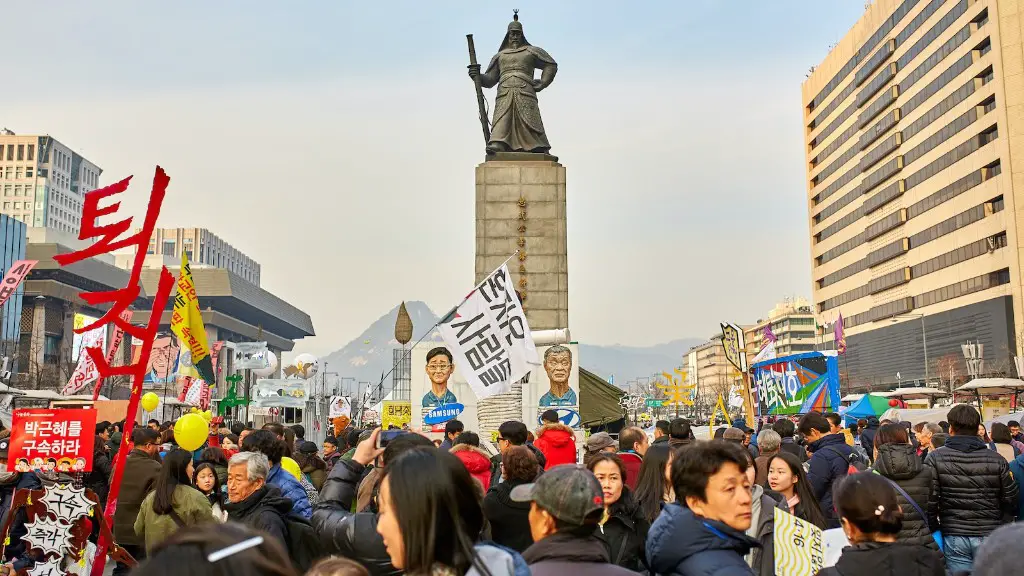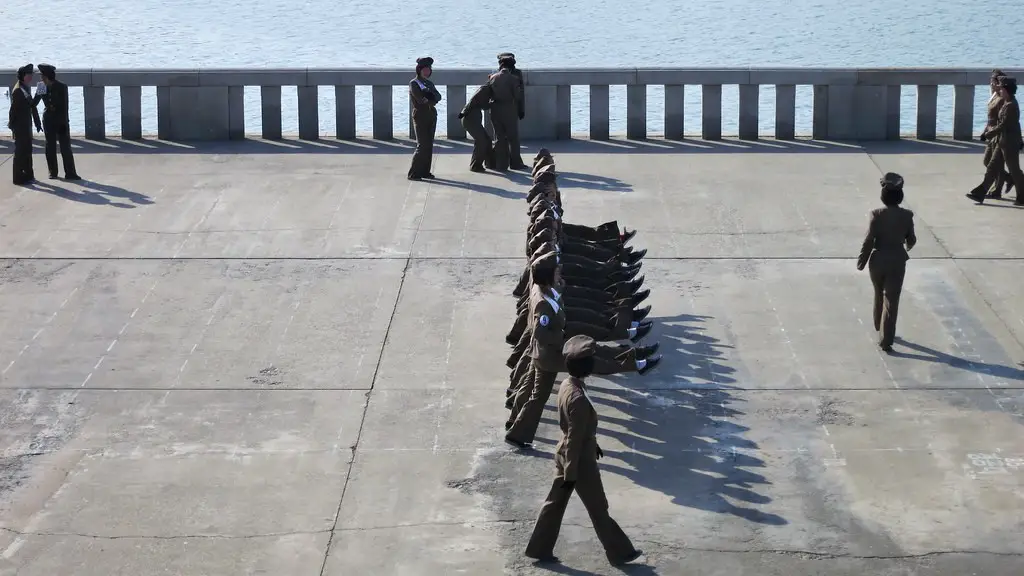North Korea’s Political Environment
North Korea is one of the most isolated countries in the world, ruled by the single party state of the Korean Worker’s Party. The current leader of North Korea, Kim Jong-un, is the third member of his family to hold absolute power in the country, following his late father and grandfather who are both seen as highly significant figures in Noreth Korea’s ideology. The current leader Kim Jong-un has been ruling since 2011, and his rule has been characterized by economic growth, improved relations with South Korea and the development of nuclear missile programs.
The economy of North Korea is centrally planned and the country is heavily reliant on foreign aid. The country is listed as a least developed country and its population lacks access to basic human needs such as clean drinking water and medical care. The majority of citizens rely on food imports from China to feed their families. Despite the unstable economy, North Korea is heavily militarized and has one of the world’s largest standing forces of millions of personnel, which is also well-equipped with nuclear weapons.
Kim Jong-un’s Role in North Korea’s Future
Kim Jong-un’s position as leader of North Korea presents numerous challenges to the future of the country and its citizens. He is seen as a highly ideological ruler, who is devoted to preserving the world’s oldest authoritarian regime. Since taking power, Kim has sought to improve North Korea’s economic and diplomatic standing, while also pursuing a military-first policy.
The president has implemented various foreign policies that have increased tensions in the region, such as reneging on denuclearization commitments, threatening South Korea and other countries, and launching nuclear and advanced missile tests. At the same time, the president has heavily invested in the development of Pyongyang and other cities in the country, utilizing construction projects to promote economic development and job creation.
The Potential Impact of Kim Jong-un’s Rule
Kim Jong-un’s rule could have several potential impacts on North Korea. On the one hand, the president has been successful in improving the country’s economy and international standing. Pyongyang’s construction projects have resulted in greater economic stability and job growth, benefiting the population. On the other hand, the president’s militaristic policies have increased tensions in the region, with South Korea particularly on edge due to the nuclear missile tests and denuclearization threats. Furthermore, North Korea’s absolute lack of freedom and human rights has been well documented, with numerous repressive measures enacted to maintain control over the population.
Experts’ Opinions on North Korea’s Political Program
Experts on North Korea are divided on the subject of Kim Jong-un’s leadership and what the future of the country holds. Some experts have suggested that the president’s economic and construction projects have had positive impacts on the country, while others have argued that the president’s militaristic policies have led to increased tensions in the region.
The main concern of many experts is that Kim Jong-un’s actions could lead to a full-blown conflict with South Korea and even result in a military intervention from the United States. With the United States and South Korea both having extensive military capabilities, experts are concerned that the consequences of a war could be catastrophic for North Korea, its citizens and its neighbors.
Analysis of Kim Jong-un’s Potential Success
The success of Kim Jong-un’s rule depends heavily on how he manages the country’s internal dynamics and foreign relations. North Korea’s economy is heavily dependent on foreign aid and could benefit from improved diplomacy with neighboring countries, as well as increased access to the global marketplace. At the same time, Kim must also ensure that the population remains under control, as the recent wave of protests and defections have shown that the population is more discontent than ever before.
International pressure is also increasing, as the United States and its allies continue to impose economic sanctions on North Korea. This could create significant problems in the future, as the country will be unable to purchase food and other resources to feed its citizens.
The Risks of Kim Jong-un’s Rule
The risks associated with Kim Jong-un’s rule are significant, as his policies have already caused tensions to rise in the region. In addition, experts have argued that the president’s policies have created a fragile economic environment in North Korea, as the country is heavily reliant on foreign aid and resources. A war with South Korea or a military intervention from the United States could have devastating consequences for the country, its citizens and its neighbors.
Furthermore, North Korea’s absolute lack of freedom and human rights means that the population is increasingly discontent and any mismanagement of the country’s economy and foreign relations could lead to social unrest. The recent wave of defections and protests has shown that the population is more aware of their rights than ever before, and they are more willing to fight for them.
The Possibility of Peaceful Transition to Democracy
The future of North Korea is difficult to predict and many experts have argued that the potential for a peaceful transition to democracy is slim. The country’s political environment is heavily controlled, and the population lacks access to basic human needs such as clean drinking water and medical care.
At the same time, some experts have asserted that North Korea is slowly transitioning to a market economy, with the government opening up its economy to foreign investments and allowing citizens to venture into private businesses. This may be an indication that the population are slowly gaining greater economic freedom, however there remains a long way to go before the country is fully open to democracy.
The Impact of International Pressure on North Korea’s Future
International pressure has been acting as a major factor in North Korea’s politics, with the United States and its allies imposing economic sanctions in an attempt to force the leadership to abandon their nuclear ambitions. This has had an effect on North Korea’s economy, as the country is highly reliant on foreign aid and resources. In addition, the sanctions have limited the population’s access to basic human needs, causing a severe humanitarian crisis in the country.
The effect of economic sanctions has been exacerbated by the country’s limited access to the global marketplace. Furthermore, the country has alienated itself from the international community due to its relentless pursuit of nuclear missile programs, which has caused tension in the region. International pressure is likely to increase in the near future, with the potential for international intervention in North Korean affairs.
Controversies Surrounding North Korea’s Nuclear Program
North Korea’s pursuit of a nuclear missile program has caused widespread controversy in the international community. North Korea insists that its nuclear program is for self-defense, however experts have claimed that the program is intended for aggression and could potentially be used to threaten other countries in the region.
This has led to significant tensions with South Korea, Japan and the United States, as well as numerous sanctions imposed by the international community to try and deter the country from pursuing its nuclear ambitions. The United Nations has repeatedly urged North Korea to abandon its nuclear missile program, however the country has remained defiant in the face of international condemnation.
Analysis of North Korea’s Nuclear Program
Experts have argued that North Korea’s nuclear missile program presents several potential risks to the international community. The country’s unpredictable leader and lack of international accountability create a hostile environment, as the president could decide to use the weapons against neighboring states. In addition, the country’s nuclear capabilities could further escalate tensions in the region, as other countries may be forced to respond to the threat of a nuclear attack.
Furthermore, the country’s isolationist stance could result in significant economic consequences if the international community is unable to effectively contain North Korea’s nuclear ambitions. This could in turn lead to the country becoming even more isolated and increase the burden on its citizens, as the economy is heavily reliant on foreign aid and resources.
Conclusion
Despite the uncertain future of North Korea and its citizens, there remains hope that the country could eventually transition to democracy. For now, it appears that Kim Jong-un will continue to rule the country for the foreseeable future, utilizing his policies to ensure the continued survival of the country’s single-party state.
The potential impact of Kim Jong-un’s rule is difficult to predict, however with increased international pressure, the future of North Korea depends on how well the country’s leader manages the internal dynamics and foreign relations. If measures are not taken to ensure stability, the consequences of Kim’s rule could be catastrophic for the country and its citizens.


